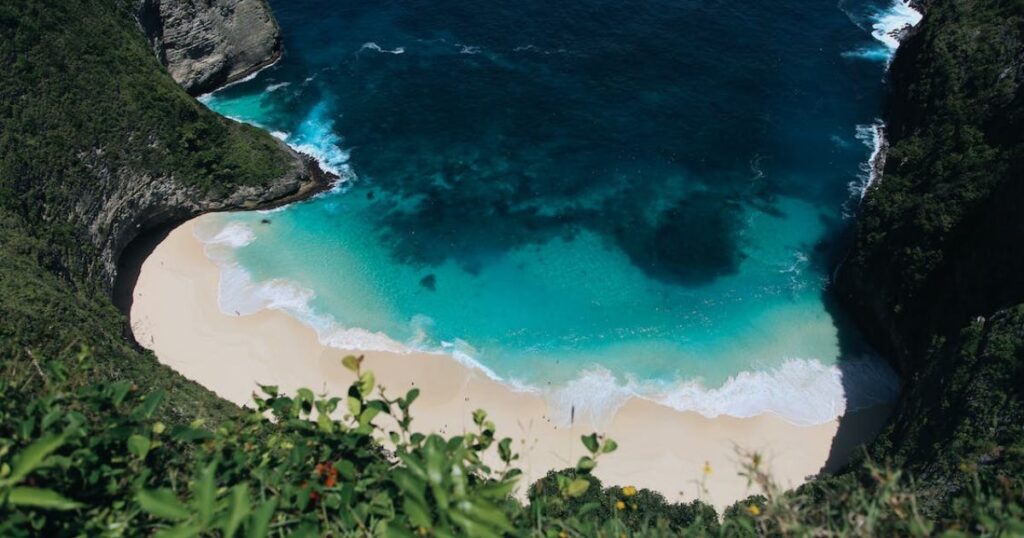From gorgeous beaches to volcanic mountains, stunning temples, and an active nightlife, Bali is jam-packed with beautiful sites to see and things to do. Add to that the fact that visas are easy to obtain and the cost of living is low, and it’s easy to see why it’s become a digital nomad hotspot.
Thinking about living in Bali as a digital nomad yourself? Here’s what you’ll need to know, from how to get the digital nomad visa to where to live, what to do, and more.
📋 Key Updates for Bali Digital Nomad Visa in 2025
- Bali has become a hotspot for digital nomads due to its stunning landscapes, vibrant culture, and affordable cost of living. With the B211 tourist Visa and E33G (from 2025) Remote Worker Visa allowing up to 180 days of income tax-free remote work, Bali is particularly attractive to those seeking a blend of work and leisure. The availability of co-working spaces, diverse living options, and active expat communities further enhances its appeal.
- Additionally, the E33G visa is valid for five years and can be renewed, providing a more stable option for remote workers compared to previous short-term visas. Applicants can apply for the E33G visa while already in Indonesia, provided they hold a valid C1 visa.
- The cost of living in Bali has increased in recent years. As of January 2025, the average cost of living index is approximately 26.7, accounting for essential expenses such as housing, food, and transportation. For digital nomads, monthly expenses typically range from IDR 15,000,000 (USD 1,000) to IDR 45,000,000 (USD 2,900), depending on lifestyle choices.
The evolution of the Bali digital nomad visa
After their tourist-dependent economy was hit hard by the onset of the COVID-19 pandemic, Indonesia began to see an uptick in travel from remote workers — particularly in Bali. To entice them even further, the government began discussing the idea of dedicated long-term digital nomad visas.
Initially proposed in 2021 by Indonesia’s tourism minister, Sandiaga Uno, the digital nomad visa was designed to allow remote workers to stay in Indonesia for up to five years, offering income tax exemptions as a key benefit. However, the original concept has since undergone significant changes, leading to the introduction of the Remote Worker Visa (E33G) in April 2024.
Bali Digital Nomad Visa – 2025 updates

The original idea of a five-year digital nomad visa for Indonesia has evolved significantly over time. While the government continues to explore ways to attract remote workers, the final outcome differs from earlier proposals. Here’s an overview of the current options and what digital nomads need to know in 2025:
What Happened to the 5-Year Digital Nomad Visa?
The widely discussed five-year digital nomad visa has not been implemented. Instead, Indonesia launched the Remote Worker Visa (E33G) in April 2024. This visa allows remote workers to stay in Indonesia for one year, with the possibility of renewing it for an additional year. While shorter than the initially proposed five-year duration, it’s a significant step toward welcoming digital nomads officially.
What About the “Second Home Visa”?
In December 2022, Indonesia introduced the Second Home Visa, which allows long-term stays of up to 10 years. However, this visa is tailored for wealthy individuals and requires applicants to deposit $130,000 in a state-owned bank or purchase a local property of equal value. This visa is not specifically designed for digital nomads but remains an option for those seeking long-term residency in Indonesia.
Best Current Option for Digital Nomads
or digital nomads who may not meet the financial requirements of the Second Home Visa, the B211A Business Visa remains a popular choice. This visa allows remote workers to live and work in Indonesia for up to 180 days, with the benefit of being income tax-free during their stay. However, it is a shorter-term solution compared to the Remote Worker Visa.
How to become a digital nomad in Bali (how to apply for the B211a visa)

Application eligibility
To be eligible for the B211a visa, you’ll need to:
- Have at least $2,000 in savings
- Be fully vaccinated against COVID-19
Bali digital nomad visa requirements & duration
Bali’s B211a visa has two options: one that lasts 60 days and can be renewed twice for a maximum duration of 180 days, and one that lasts 180 days. Note that this is a single-entry visa, so once you leave the country, you can’t re-enter it without applying for a new one.
To apply for the B211a visa, you’ll need the following documents:
- A passport valid for at least six more months for the 60-day option, or twelve more months for the 180-day option
- Proof of at least $2,000 in savings
- A return ticket to your country of origin — or a ticket to another country — at the end of your visa period
- 2 passport-sized photographs in color
- Proof of vaccination
To apply, simply fill out the application on the Directorate General of Immigration Officer website or the Online Visa Approval portal. Upon successful completion, you’ll receive a payment code for a fee (between $100 to $400, depending on which visa option you apply for). After paying, the Immigration Officer will create a profile for you, verify your data, approve your application, and issue the visa to you.
The process from application submission to visa issuance generally takes one to two weeks. After being granted the visa, you’ll have 90 days to enter the country.
Health insurance for digital nomads in Bali
While health insurance isn’t a requirement for the B211a visa, it is good to have so that you’re prepared in case you have an accident or fall ill. Food poisoning in particular is such a common occurrence with tourists that there’s even a term for it: Bali Belly.
What is Bali Belly?
Bali Belly typically occurs within the first week or two of arrival and signals that your body is actively adjusting to the new environment. The condition is characterized by stomach cramps, nausea, vomiting, diarrhea, and general stomach pain and discomfort. Bali Belly is extremely common and generally not serious, and health insurance ensures you’ll get the appropriate medical attention and treatment.
One popular option among digital nomads is Safetywing, which starts at about $45 per month for adults up to 39 years old.
Expats in Bali: Best places to live

Although Bali is only around 2,200 square miles — a bit smaller than Delaware — there are multiple destinations worth checking out.
Canggu
Canggu is undoubtedly the largest digital nomad hotspot in Bali, known for its hipster feel, great surfing, and a variety of restaurants, bars, cafés, clubs, and even co-working spaces.
Ubud
Ubud is another top digital nomad destination, although a bit quieter than Canggu. Still, there are plenty of places to work, dine, and hang out as well as the opportunity to unwind in nature or at yoga/meditation retreats.
Kuta
Kuta is the party capital of Bali, with tons of great bars and clubs. Its beach is legendary as well, and perfect for those who enjoy watersports like surfing, wakeboarding, scuba diving, and more.
Seminyak
Seminyak has great nightlife as well, although the feel is a bit more chill (think beach clubs versus nightclubs). On top of that, Seminyak is known for its excellent shopping.
Jimbaran
Jimbaran is less touristy and more traditional, but it’s still a good option for digital nomads, as it has a handful of well-known co-working spaces and some of the best (and most advanced) surfing around.
Digital nomad life in Bali

Is Bali a country or a city?
Actually, Bali is actually neither a country nor a city! It is a province of Indonesia, which consists of the main island of Bali and several smaller islands.
Bali language & currency
Indonesian is the primary language in Bali, but many locals’ native language is Balinese. English is spoken widely in the hospitality sector, especially in popular tourist destinations and digital nomad/expat communities. That being said, many locals speak limited English, so it’s a good idea to learn at least some basic phrases in Indonesian or Balinese.
The currency used in Bali is the Indonesian Rupiah (IDR). $1 USD is worth about Rp 16,000.
Average cost of living in Bali
It varies from place to place, of course, but the average cost of living in Bali is much lower than in the majority of the US. Here are the costs of a few common expenses, according to Numbeo:
- 1-Bedroom Apartment in City Center: About Rp 7.3 million (~$491)
- 1-Bedroom Apartment Outside of City Center: About Rp 4.3 million (~$288)
- 3-Bedroom Apartment in City Center: About Rp 23 million (~$1,534)
- 3-Bedroom Apartment Outside of City Center: About Rp 14.3 million (~$958)
- Estimated Monthly Costs Besides Rent: About Rp 8.2 million (~$550)
What to do in Bali
So what exactly is there to do in Bali? Here are some of the highlights:
- Swim, sunbathe, or partake in water sports at one of Bali’s many beaches
- Explore the shrines and temples at sites like Uluwatu Temple, Gunung Kawi Temple, or Tirta Empul
- Take Instagram-worthy pics at Tegalalang Rice Terrace
- Unwind at a yoga or meditation retreat
- Go island hopping to experience the unspoiled natural beauty
- Sip a cocktail while taking in ocean views at a beach club
- Go on a waterfall hike to a place like Banyumala Twin Waterfalls or Sekumpul Waterfall
- Get up close and personal with the local wildlife at the Sacred Monkey Forest Sanctuary
- Visit a museum like Setia Darma House of Mask and Puppets or Museum Pasifika
- Marvel at the handcrafted goods at markets like Sukawati Art Market or Ubud market
- Explore national parks like West Bali National Park and Bromo Tengger Semeru National Park
Expat community in Bali: how to find your people
It’s natural to feel nervous about moving to a new place — especially if you won’t know anybody there. Luckily, there are plenty of folks in Bali just as eager to meet friends as you are. A few ideas to get started:
- Work from a co-working space or stay in a co-living community
- Stay at a hostel — those with large common spaces like bars or terraces tend to be the best for socializing
- Attend events through apps like Meetup and Couchsurfing
- Join Facebook groups for expats in Bali
- Take classes according to your interests (cooking, surfing, crafts, etc.)
- Use an app like HelloTalk or Tandem to find a local language exchange buddy
- Volunteer in your local community
Moving to Bali

Before you head to Bali, make sure you cross the following off of your to-do list:
- Gather all of your important documents (passport, visa, etc.)
- Set up a doctor’s appointment to get any vaccines or medications you might need
- Buy tickets for your flights both into and out of the country
- Book accommodations for your arrival
- Research what to bring, create a list, and pack your bags
- Flag your travel plans to your bank so they don’t mark purchases abroad as suspicious
- Set up a forwarding address for your mail, if necessary
- Connect with other digital nomads in Bali for advice on sites like Reddit or Facebook
Taxes in Bali for digital nomads
Holders of the B211a visa aren’t subject to Indonesian income taxes. The Indonesian government is discussing imposing a tourist tax for those who visit Bali, although no decision has yet been reached.
VAT in Bali
The standard rate for the value-added tax (VAT) — the sales tax placed on goods and services — in Indonesia is 11% (and 12% for luxury goods and services for tax year 2025). However, some things, like food/drinks in hotels/restaurants and healthcare services, are exempt from taxes.
Do American digital nomads in Bali have to pay US taxes?
Yes. All US citizens and permanent residents — even those living outside of the US — are required to file a federal tax return as long as they meet the minimum filing threshold. The good news is, there are a number of tax provisions that can help you avoid double taxation when living abroad:
- Foreign Earned Income Exclusion (FEIE): Allows those who qualify to exclude up to $126,500 of foreign-earned income (for tax year 2024) and up to 130,000 (for tax year 2025) from taxation
- Foreign Tax Credit (FTC): Allows those who qualify to deduct what they have paid in foreign income taxes from what they owe the US
- Foreign Bank Account Report (FBAR): Requires those with $10,000 or more in foreign accounts to file FinCEN Report 114
- Child Tax Credit (CTC): Allows parents to claim up to $2,000 in partially-refundable credits per qualifying dependent
- Foreign Account Tax Compliance Act (FATCA): Requires those with over $200,000 in foreign assets on the last day of the tax year (or over $300,000 at any point in the tax year) to file Form 8938. (Thresholds for filing Form 8938 are much lower for those who reside in the US).

 Connect on LinkedIn
Connect on LinkedIn



